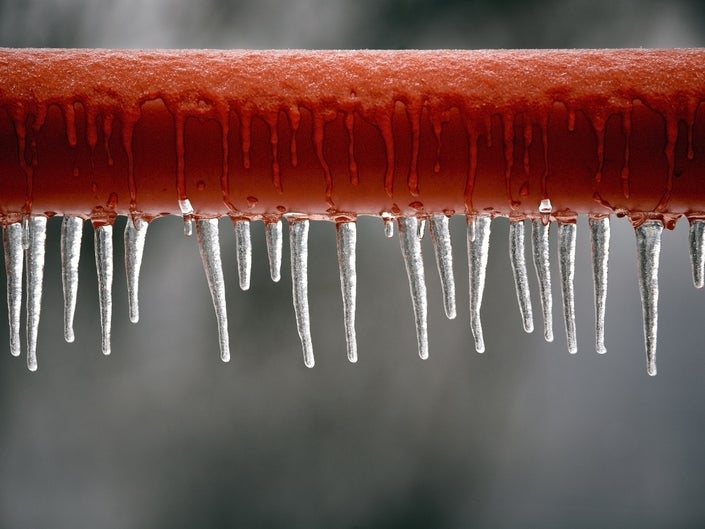
Six Reasons Why Pipes Burst
1. Frozen Water Pipe Can Be An Expensive Problem:
When water freezes, it expands. This expansion can put a lot of pressure on pipes, causing them to crack or burst. This is a frequent problem in cold climates where pipes are not properly insulated especially on an exterior wall or exposed to cold outdoor temperatures like a hose faucet or in crawl space. Learn more.
How Do I Thaw A Frozen Water Pipe?
- Avoid a pipe burst. Keep the faucet open. Running a slow amount of water through the pipe will help melt ice in the pipe.
- Apply heat to the frozen section of pipe using an electric hair dryer, a portable space heater (kept away from flammable materials), an electric heating pad wrapped around the pipe, or wrap pipes with hot towels. Do NOT use open flame device like a blowtorch, kerosene or propane heater, charcoal stove.
- If one pipe freezes, others may freeze, too. Check all faucets for low pressure.
- If you cannot find or access the frozen area or if you cannot thaw the pipe, call the areas oldest plumbers. PDM plumbers have the tools and experience to get you back to normal fast.
2. Pipe Burst Due To High Water Pressure:
Stress on Pipes: Pipes are designed to handle a certain amount of pressure. High water pressure puts extra stress on the pipes, their joints, and seals. Over time, this stress can weaken them, making them more prone to cracks and bursts. This can be caused by a malfunctioning pressure regulator or a problem with the municipal water supply.
Water Hammer Effect: When you shut off a high-pressure water flow abruptly, it creates a surge of pressure called the water hammer effect. This pressure spike can damage pipe joints and faucets, potentially causing them to burst.
Normal Water Pressure Range: Normal household water pressure typically falls between 50 and 80 psi (pounds per square inch). You can buy a hose bib gauge at a hardware store to measure your water pressure at home.
Signs of High Water Pressure: Some signs that your water pressure might be too high include noisy pipes, leaking faucets, appliances that malfunction due to water pressure issues, and frequent bursts.
3. Pipe Burst Due To Corrosion:
Over time, pipes can corrode and rust, which can weaken the pipes and make them more susceptible to bursting. This is a particular concern with older pipes made of galvanized steel or iron.
Common types of corrosion:
- Oxidation: This is when oxygen in the water reacts with the metal, forming rust. Rust can cause pinhole leaks or larger cracks.
- Pitting corrosion: This creates deep holes in the pipe wall, significantly reducing its strength.
- Uniform corrosion: This thins the pipe wall all around, making it more likely to burst under pressure.
Signs of pipe corrosion:
- Discolored water: Rusty or brown water can indicate corrosion in the pipes.
- Reduced water pressure: Corrosion can narrow the pipe diameter, reducing water flow.
- Leaks: Small leaks can be a sign of early-stage corrosion that could worsen.
- Bulges in pipes: Corrosion can cause the pipe to bulge outward.
Preventing pipe bursts due to corrosion:
- Regular inspections: A plumber can inspect your pipes for signs of corrosion.
- Replacing old pipes: If your home has galvanized steel or iron pipes (common in older homes), consider replacing them with more corrosion-resistant materials like copper or PEX.
- Water treatment: In some cases, water treatment systems can help reduce corrosion by removing minerals that contribute to the process.
If you suspect a burst pipe due to corrosion, act quickly:
- Shut off the main water valve to your home.
- Call a plumber to assess the damage and make repairs.
By being proactive about preventing corrosion, you can save yourself from the hassle and expense of a burst pipe.
4. Pipe Burst Due To Clogs:
Increased Pressure: If a pipe becomes clogged with debris, it can block the flow of water and cause pressure to build up and cause a pipe burst. Clogs can be caused by a buildup of mineral deposits, sediment, or even foreign objects.
Strained Pipes: Over time, this pressure can strain the pipes, especially older or weakened ones, making them susceptible to bursting.
Whole House Water Filter: A filter is one way to remove debris in the water.
5. Pipe Burst Due To Ground Movement:
Ground movement is a definite cause of pipe bursts. Here’s how it happens:
Shifting soil: When the ground soil moves, it puts stress on the pipes buried beneath. This stress can cause cracks or complete bursts in the pipes, especially if they are already brittle or old. Common causes of shifting soil include:
-
- Heavy rain or flooding: Saturated ground can become loose and unstable, leading to movement.
- Freezing and thawing cycles: As water in the soil freezes and expands, it can heave the ground and put stress on pipes.
- Earthquakes or tremors: These can cause significant ground movement and damage to underground infrastructure.
Pipe material: Older pipes made of cast iron are more susceptible to cracking under stress compared to newer,more flexible materials like PEX.
Unfortunately, you can’t entirely prevent ground movement from happening due to natural causes. But there are ways to mitigate the risk:
- Proper drainage: Ensuring proper drainage around your house can help prevent the soil from becoming saturated and shifting.
- Knowing your pipes: If your house has old cast iron pipes, consider replacing them with more flexible materials. A plumber can inspect your pipes to assess their condition.
6. Pipe Burst Due To Improper Installation:
If pipes are not installed correctly, they may be more likely to burst. This can include using the wrong type of pipe, not using proper supports, or not properly connecting the pipes.
Incorrect joining methods: Pipes need to be connected securely using soldering, crimping, or other approved methods. Faulty connections can weaken and eventually burst under pressure.
Wrong pipe material: Not all pipes are made equal. Using a type of pipe not suited for the water pressure or temperature can lead to failure.
Improper support: Pipes need to be well-supported to prevent strain and stress. Incorrect hanging, lack of clamps,or exposure to excessive movement can cause cracks or breaks.
Neglecting expansion and contraction: Pipes expand and contract with temperature changes. Improper installation that doesn’t account for this movement can put stress on the joints and lead to leaks or bursts.
If you suspect a burst pipe due to improper installation, it’s important to call a licensed plumber to assess the situation. They can diagnose the problem, perform repairs, and ensure everything is up to code to prevent future issues.
Choose A Plumber With A Proven History
For 139 years we’ve been here to hep. We can help with pipe leak inspection & repair services in Joliet SW Chicago suburbs area. Contact PDM Plumbing, Heating, Cooling Since 1885 for fast help. We have a proven track record of trusted service. Phone 815-390-7095.






